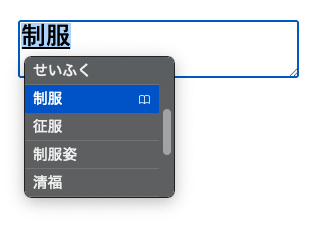The Problem with 'Enter to Submit' and Japanese Input
A common UI pattern these days is to have an "Enter to Submit" text box. Good implementations might even give you Shift + Enter to add a new line if you want to. There's an issue, though, that often gets overlooked for Japanese and many other languages that use an IME (Input Method Editor) to assist in typing languages with complex character sets.

Example of Japanese IME input
The problem lies in the overloading of the Enter key. To make a selection from this list of words the IME uses the Enter key. So, the desired behavior is to submit the form when the Enter key is pressed and the IME is not in use.
A typical implementation without considering IME might look like this:
const textarea = document.getElementById("input-textarea");
textarea.addEventListener("keydown", function (e) {
// Shift + Enter should trigger a new line
if (e.key === "Enter" && !e.shiftKey) {
e.preventDefault(); // prevent new line on submit
submit();
}
});
IME completions do use the Enter key, so the event's key value is Enter. We need an additional check for IME input. Thankfully, the browser actually provides a flag for just this purpose on the keypress events: isComposing, which we can simply add into the submit check.
Unfortunately, this is the web, so due to an issue in Safari we can't rely on the isComposing flag completely. The recommended workaround is to check for e.keyCode === 229.
From the W3 UI Events spec:
7.3.1. How to determine keyCode for keydown and keyup events The keyCode for keydown or keyup events is calculated as follows:
...
If an Input Method Editor is processing key input and the event is keydown, return 229.
I think the purpose of this was to mask IME key presses from typical website functionality like this problem, but from a modern development perspective it's a bit arbitrary to be hiding what key was pressed. Technically, keyCode is a deprecated property, so I hope isComposing gets better WebKit support in the future.
Factoring in isComposing and the e.keyCode === 229 Safari workaround would look like this:
const textarea = document.getElementById("input-textarea");
textarea.addEventListener("keydown", function (e) {
// Check for IME input
const isComposing = e.isComposing || e.keyCode === 229;
// Shift + Enter should trigger a new line
if (e.key === "Enter" && !e.shiftKey && !isComposing) {
e.preventDefault(); // prevent new line on submit
submit();
}
});
For websites that have this problem, I can at least write my text in TextEdit or another app first, then copy and paste it into the form as a workaround.